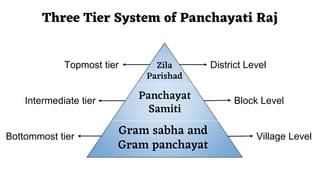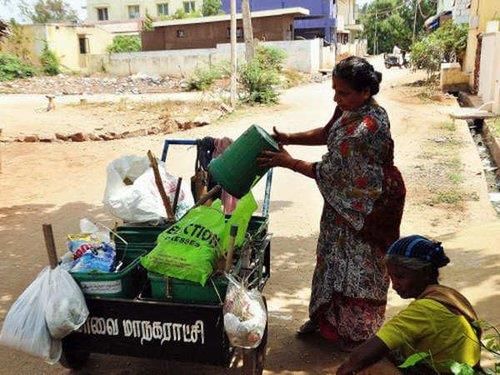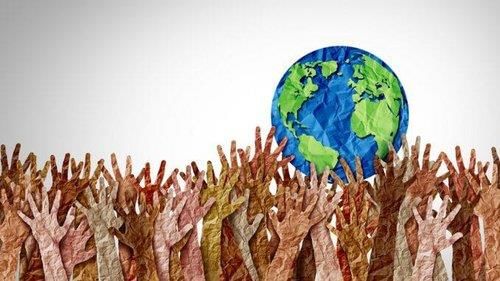|
Card: 1 / 36 |
What is the concept of participatory democracy in the context of Indian governance? |
|
Card: 2 / 36 |
Participatory democracy refers to the active involvement of citizens in the decision-making processes at all levels of governance—local, regional, and national—encouraging them to take part in running their country. |
|
Card: 3 / 36 |
Fill in the blanks: Local governance forms the ___ level of the governance pyramid in India, while national governance is at the ___ level. |
|
Card: 5 / 36 |
What role does understanding local governance play for citizens in a democratic country like India? |
|
Card: 6 / 36 |
Understanding local governance helps citizens learn about administration, voting, and their rights, enabling them to engage effectively in the democratic process. |
|
Card: 7 / 36 |
What are the two main components of good governance that encourage citizen participation? |
|
Card: 9 / 36 |
Fill in the blank: Good governance in a democracy encourages ___ involvement of citizens. |
|
Card: 11 / 36 |
Multiple Choice: What is the primary benefit of citizens being involved at the local level in governance? A) Increased taxes B) Learning about rights and responsibilities C) Less government accountability D) More bureaucratic processes |
|
Card: 14 / 36 |
Urban local bodies oversee local issues, provide services like water supply and sanitation, maintain infrastructure, manage waste collection, and ensure the implementation of government schemes. |
|
Card: 15 / 36 |
Fill in the blanks: Urban local bodies function at a ___ level, allowing for direct community participation in managing local issues. |
|
Card: 17 / 36 |
True or False: Only cities with populations over 10 lakhs have a Municipal Council as their governing body. |
|
Card: 18 / 36 |
False. Cities with populations between 1 and 10 lakhs have a Municipal Council, while those over 10 lakhs have a Municipal Corporation. |
|
Card: 20 / 36 |
Ward committees help organize health camps, run campaigns against plastic use, and monitor local issues like water leaks and road conditions. |
|
Card: 21 / 36 |
Fill in the blank: The system of urban local bodies is an example of ___ democracy. |
|
Card: 23 / 36 |
Multiple Choice: What is one of the primary responsibilities of urban local bodies? |
|
Card: 25 / 36 |
What was the significance of the Parliamentary Act passed in 1792 for the Madras Corporation? |
|
Card: 26 / 36 |
It granted the Madras Corporation the authority to levy municipal taxes, marking the beginning of proper municipal administration in Madras. |
|
Card: 27 / 36 |
True or False: Elected representatives in urban local bodies do not address the needs of the local population. |
|
Card: 28 / 36 |
False. Elected representatives work to address the needs and concerns of the local population. |
|
Card: 31 / 36 |
Riddle: I help communities thrive, with local leaders I strive. In cities, I provide governance, what am I? |
|
Card: 33 / 36 |
What is the primary benefit of understanding and engaging in local governance? |
|
Card: 35 / 36 |
Multiple Choice: What ensures efficient urban management? A) Centralized control B) Decentralized governance C) Lack of citizen involvement D) None of the above |


























